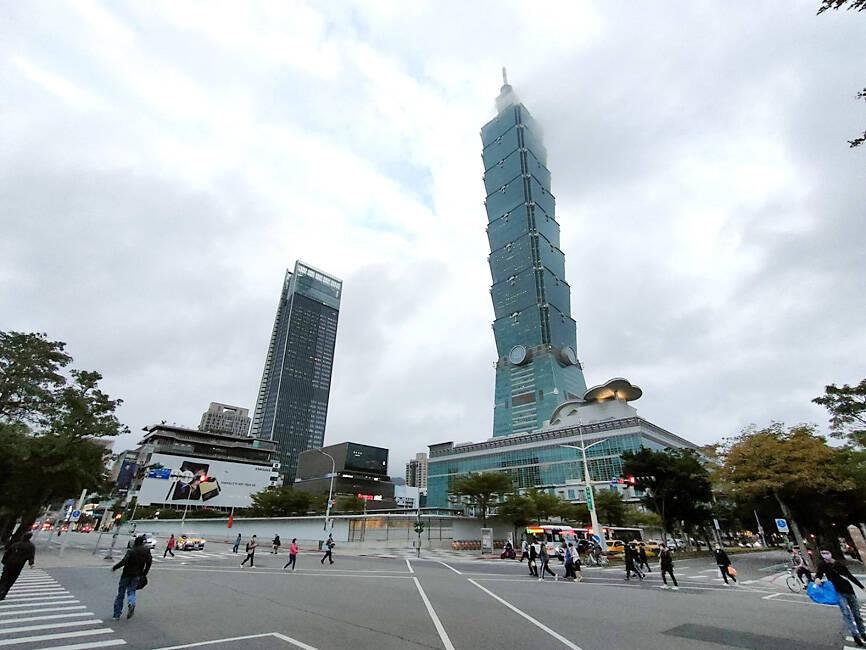Taiwan has been ranked as the ninth most digitally competitive country this year, moving up two places from last year, among the 64 countries evaluated by the Swiss-based International Institute for Management Development (IMD), according to a report that was released yesterday.
The IMD World Digital Competitiveness Ranking, which used 54 indicators based on three major factors, showed Taiwan in third place in technology, a jump from sixth last year.
For the other two major factors — knowledge and future readiness — Taiwan was ranked 18th and seventh respectively, with the latter representing a rise from eighth place last year.

Photo: Hsu Yi-ping, Taipei Times
Meanwhile, among the 54 indicators, Taiwan took the top spot in five areas, namely total research and development (R&D) personnel per capita, information technology (IT) and media stock market capitalization, mobile broadband subscribers, agility of companies, and use of big data and analytics.
Other noteworthy standings included the indicators of higher education achievement and total expenditure on R&D — two areas in which Taiwan rose in the rankings to third place in the IMD report.
Taiwan’s leading performances in fields such as IT, media stock market capitalization and mobile broadband can be attributed to the government’s efforts to provide subsidies and other incentives to telecommunications companies to construct and expand the 5G network infrastructure, the Ministry of Digital Affairs said.
Regarding the future readiness factor, the ministry said that the category primarily measures the degree of digital transformation in a country, and Taiwan ranked first in two indicators — agility of companies and the use of big data and analytics.
This is because Taiwan’s economic model, which features small and medium-sized enterprises, has the advantages of flexibility and quick response to market changes, the ministry said.
The top rankings reflect the government’s effective efforts to subsidize small, medium and micro enterprises to promote digital transformation and technological innovations such as cloud computing and data analysis, the ministry said.
The assessments in the IMD’s latest report would serve as a reference for the government’s policymaking, as part of the efforts to develop Taiwan’s digital economy, promote information security and expand public-private collaboration to achieve digital transformation, the ministry said.

TRAGEDY STRIKES TAIPEI: The suspect died after falling off a building after he threw smoke grenades into Taipei Main Station and went on a killing spree in Zhongshan A 27-year-old suspect allegedly threw smoke grenades in Taipei Main Station and then proceeded to Zhongshan MRT Station in a random killing spree that resulted in the death of the suspect and two other civilians, and seven injured, including one in critical condition, as of press time last night. The suspect, identified as a man surnamed Chang Wen (張文), allegedly began the attack at Taipei Main Station, the Taipei Fire Department said, adding that it received a report at 5:24pm that smoke grenades had been thrown in the station. One man in his 50s was rushed to hospital after a cardiac arrest

SAFETY FIRST: Double the number of police were deployed at the Taipei Marathon, while other cities released plans to bolster public event safety Authorities across Taiwan have stepped up security measures ahead of Christmas and New Year events, following a knife and smoke bomb attack in Taipei on Friday that left four people dead and 11 injured. In a bid to prevent potential copycat incidents, police deployments have been expanded for large gatherings, transport hubs, and other crowded public spaces, according to official statements from police and city authorities. Taipei Mayor Chiang Wan-an (蔣萬安) said the city has “comprehensively raised security readiness” in crowded areas, increased police deployments with armed officers, and intensified patrols during weekends and nighttime hours. For large-scale events, security checkpoints and explosives

A car bomb killed a senior Russian general in southern Moscow yesterday morning, the latest high-profile army figure to be blown up in a blast that came just hours after Russian and Ukrainian delegates held separate talks in Miami on a plan to end the war. Kyiv has not commented on the incident, but Russian investigators said they were probing whether the blast was “linked” to “Ukrainian special forces.” The attack was similar to other assassinations of generals and pro-war figures that have either been claimed, or are widely believed to have been orchestrated, by Ukraine. Russian Lieutenant General Fanil Sarvarov, 56, head

PUBLIC SAFETY: The premier said that security would be tightened in transport hubs, while President Lai commended the public for their bravery The government is to deploy more police, including rapid response units, in crowded public areas to ensure a swift response to any threats, President William Lai (賴清德) said yesterday after a knife attack killed three people and injured 11 in Taipei the previous day. Lai made the remarks following a briefing by the National Police Agency on the progress of the investigation, saying that the attack underscored the importance of cooperation in public security between the central and local governments. The attack unfolded in the early evening on Friday around Taipei Main Station’s M7 exit and later near the Taipei MRT’s Zhongshan